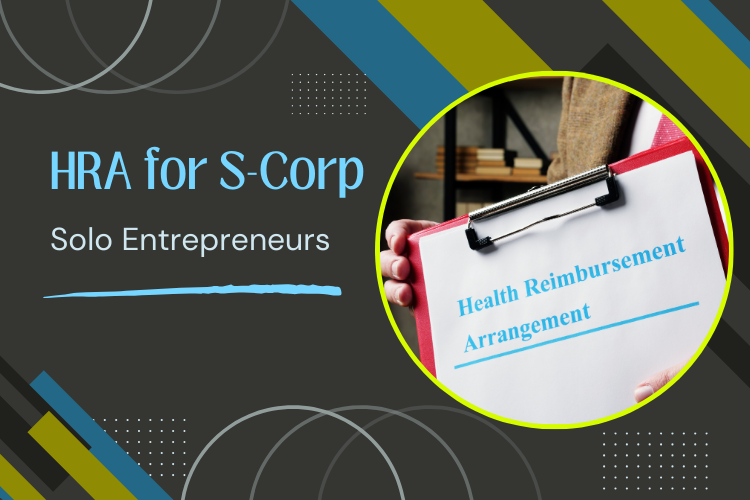As a solo entrepreneur operating an S-Corporation, understanding how to manage your healthcare costs effectively is crucial. One tax-advantaged tool that can benefit S-Corp owners is the Health Reimbursement Arrangement (HRA).
However, the rules surrounding HRAs for S-Corp owners can be complex. This blog post will explain everything you need about HRAs and how to use them in your business.
It will focus on hiring a spouse to use an Individual Coverage HRA (ICHRA).
What is an HRA?

An HRA is an employer-funded plan that reimburses employees for qualified medical expenses up to a certain amount each year.
These reimbursements are tax-free for the employee and deductible for the employer, which makes them an excellent way to control healthcare costs.
HRA Options for S-Corp Solo Entrepreneurs

As a solo entrepreneur with an S-Corp, you’re both the employer and the employee, which presents unique challenges and opportunities.
Here are the HRA options available to you:
1. Qualified Small Employer HRA (QSEHRA):
This plan is designed for businesses with fewer than 50 employees that don’t offer group health insurance. However, as an S-Corp owner, you’re not considered an employee, so you couldn’t participate directly in a QSEHRA.
2. Individual Coverage HRA (ICHRA):
This new type of HRA can work for any size business and is compatible with individual health insurance coverage.
However, S-Corp shareholders with more than 2% ownership are not considered employees and cannot participate in an ICHRA on a tax-free basis.
Challenges for S-Corp Solo Entrepreneurs

The IRS does not consider S-Corp owners who own more than 2% of the company’s shares to be employees for tax-free benefits.
This implies that although the S-Corp can establish a Human Resources Act (HRA), the solo entrepreneur is excluded from receiving tax-exempt reimbursements directly through the HRA.
Workarounds and Best Practices
Despite the challenges, there are ways to structure your business affairs to take advantage of HRAs:
1. Employ a Family Member:

- If you employ your spouse and own less than 2% of the S-Corp, they could be eligible for tax-free HRA benefits.
- The S-Corp can establish an ICHRA for your spouse’s benefit. This arrangement facilitates the provision of tax-exempt reimbursements to one’s spouse for eligible medical expenses, including health insurance premiums.
- Your spouse’s employment must be legitimate, meaning they perform bona fide services for the S-Corp and receive reasonable compensation.
- Incorporating your spouse into the company’s ICHRA will allow the plan to cover the medical costs of the employee’s family, which includes you as the S-Corp owner.
- This strategy effectively lets the S-Corp use pre-tax dollars to pay for the family’s health care costs, including those of the more-than-2% owner, by having the spouse join the ICHRA.
2. Taxable Compensation:
- While you can’t receive tax-free reimbursements directly, the S-Corp can still reimburse you for healthcare expenses.
- These reimbursements would be included in your taxable compensation but can be deducted by the S-Corp as a business expense.
3. Deduct Health Insurance Premiums:

- S-Corp owners with more than 2% ownership can directly deduct 100% of their health insurance premiums on their personal income tax return.
- The plan must be established under the S-Corp, and the premiums must be included in the owner’s W-2 wages.
Conclusion
While HRAs present a tax-advantaged way to manage healthcare costs, S-Corp solo entrepreneurs face specific limitations.
By understanding these restrictions and exploring creative solutions, such as employing a spouse to participate in an ICHRA, you can still find ways to maximize your benefits.
Always consult with a tax professional or a benefits advisor to ensure compliance with IRS rules and to tailor a strategy that fits your unique business situation.
This blog post is intended to provide an overview and should not be taken as professional tax or legal advice. Tax laws are complex and subject to change, so it’s essential to consult a qualified professional who can advise based on the latest regulations and your specific circumstances.

